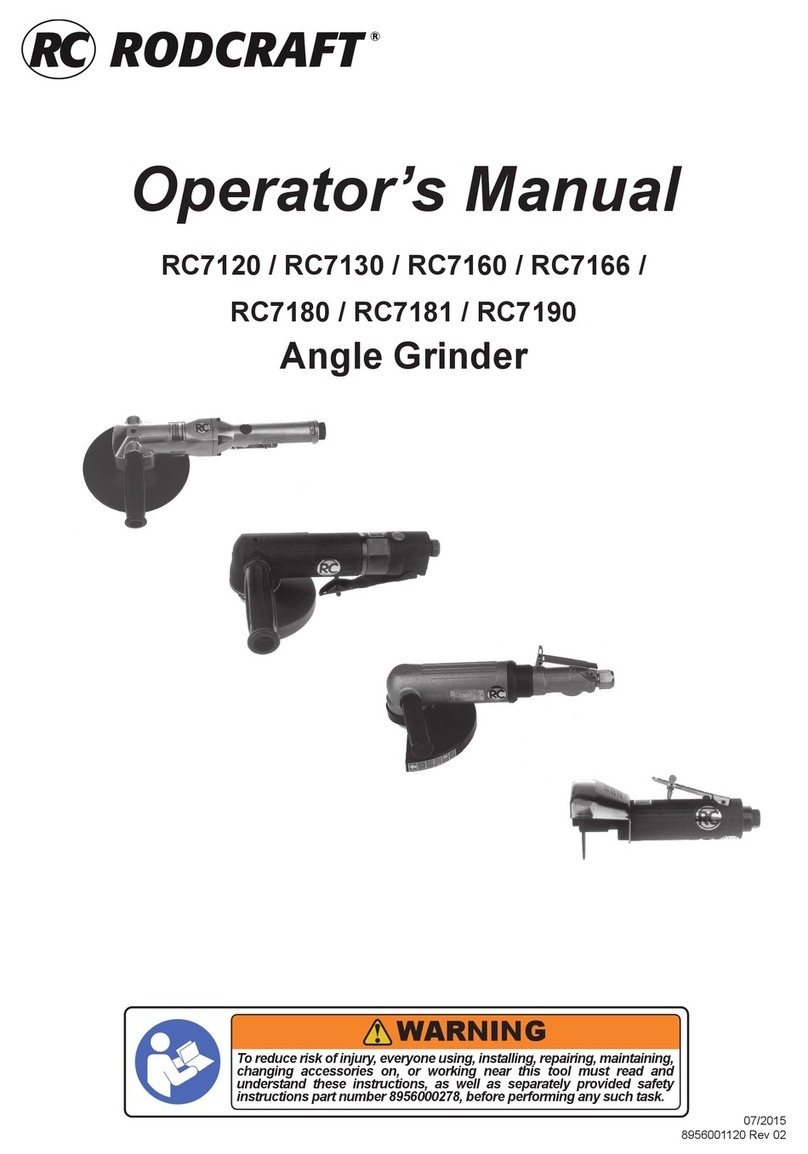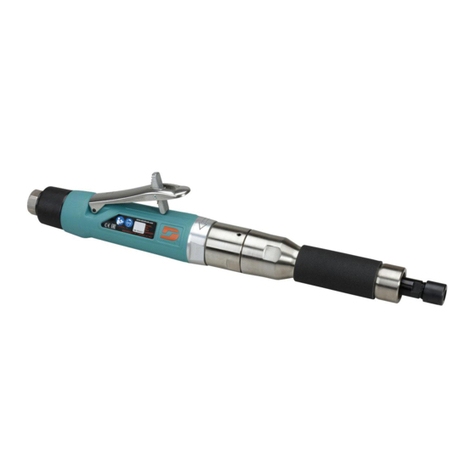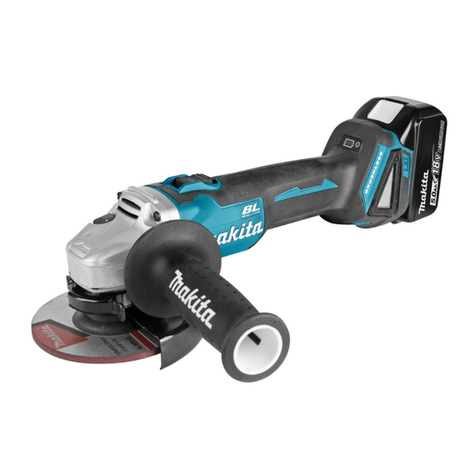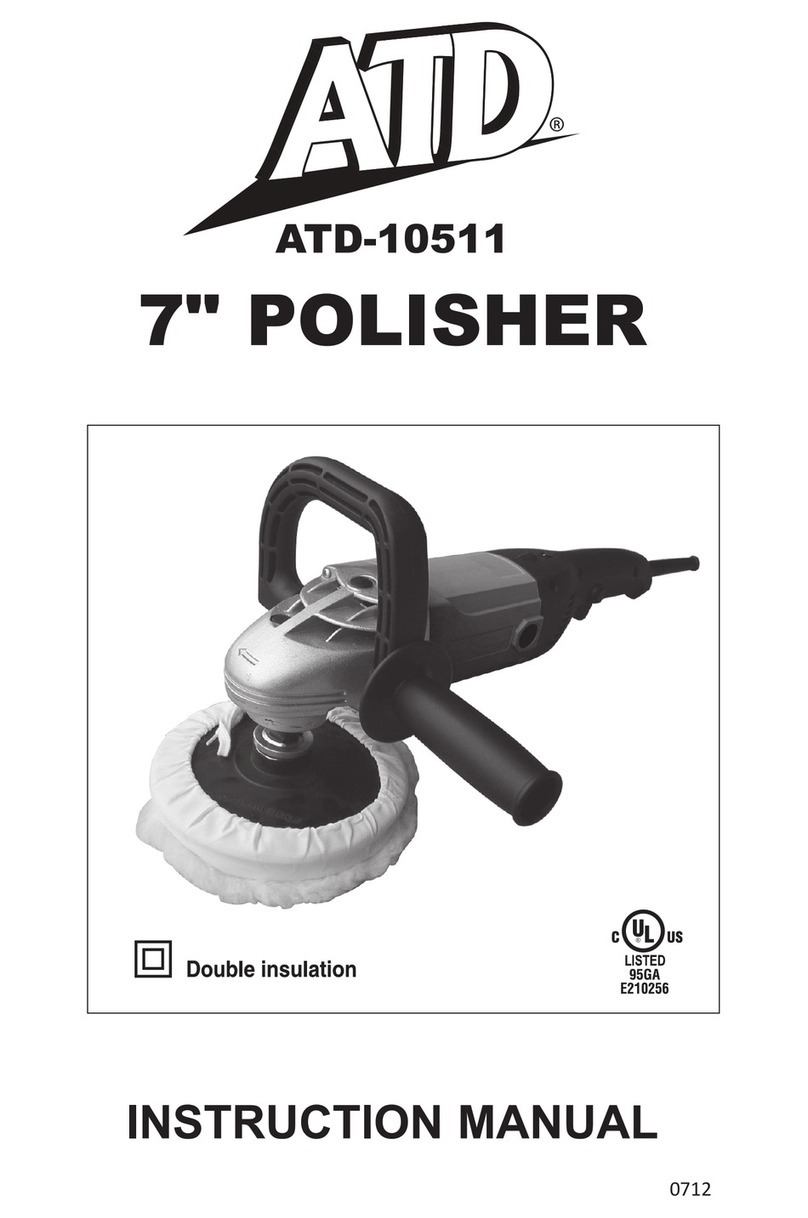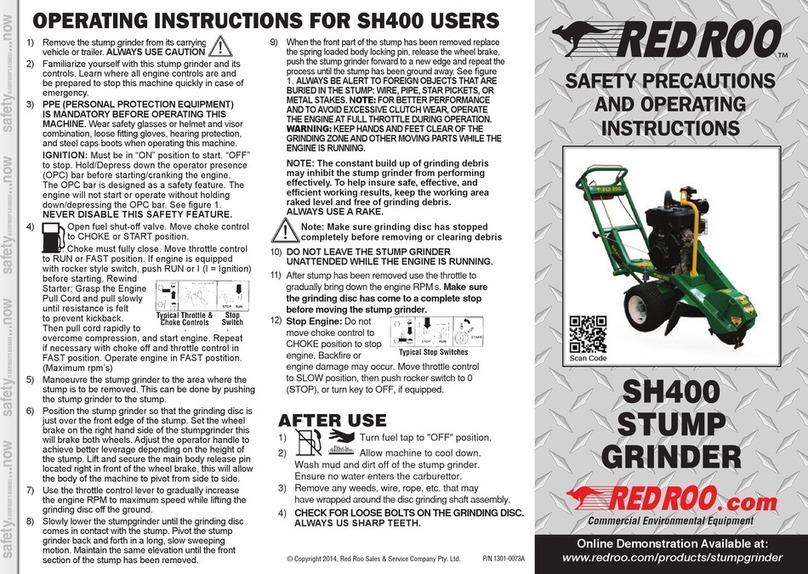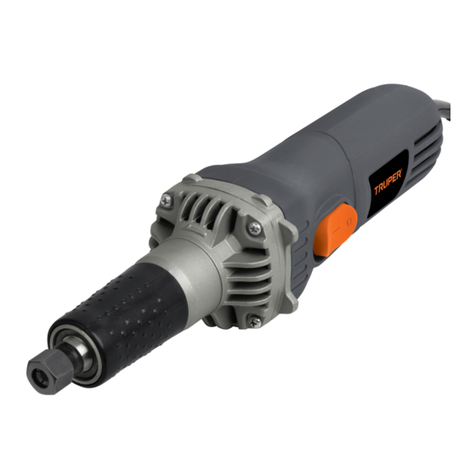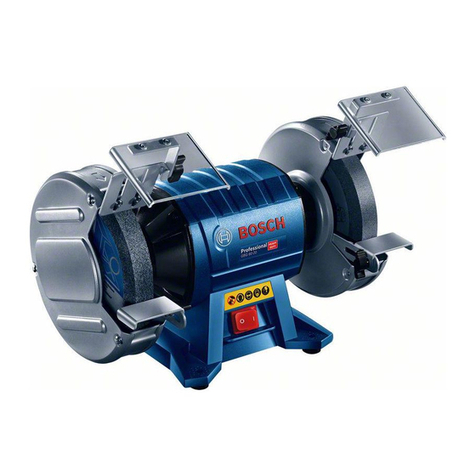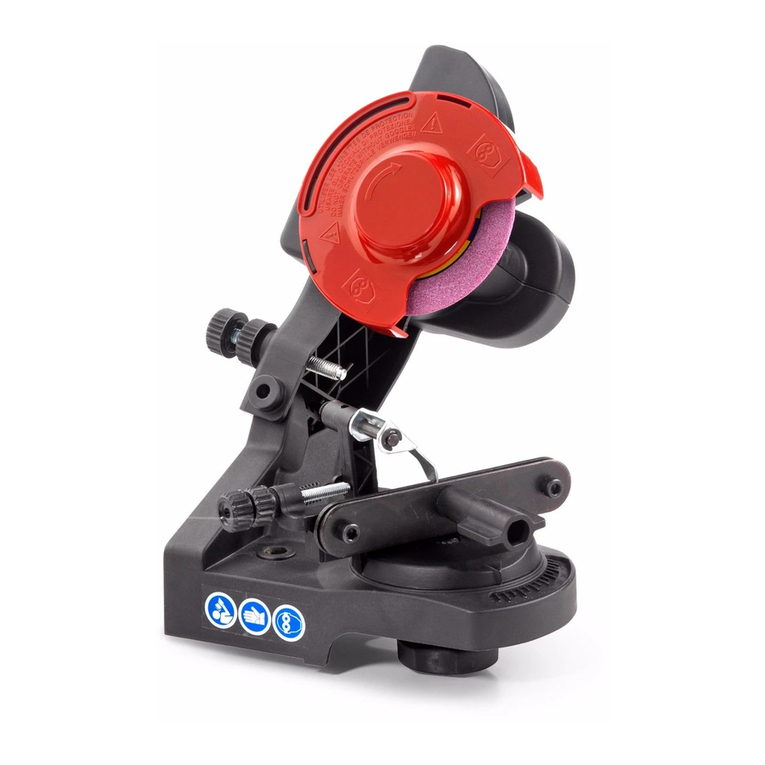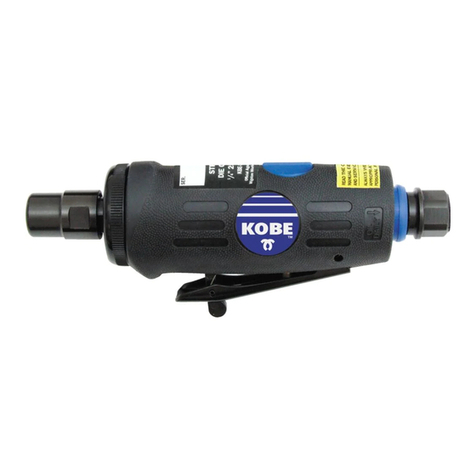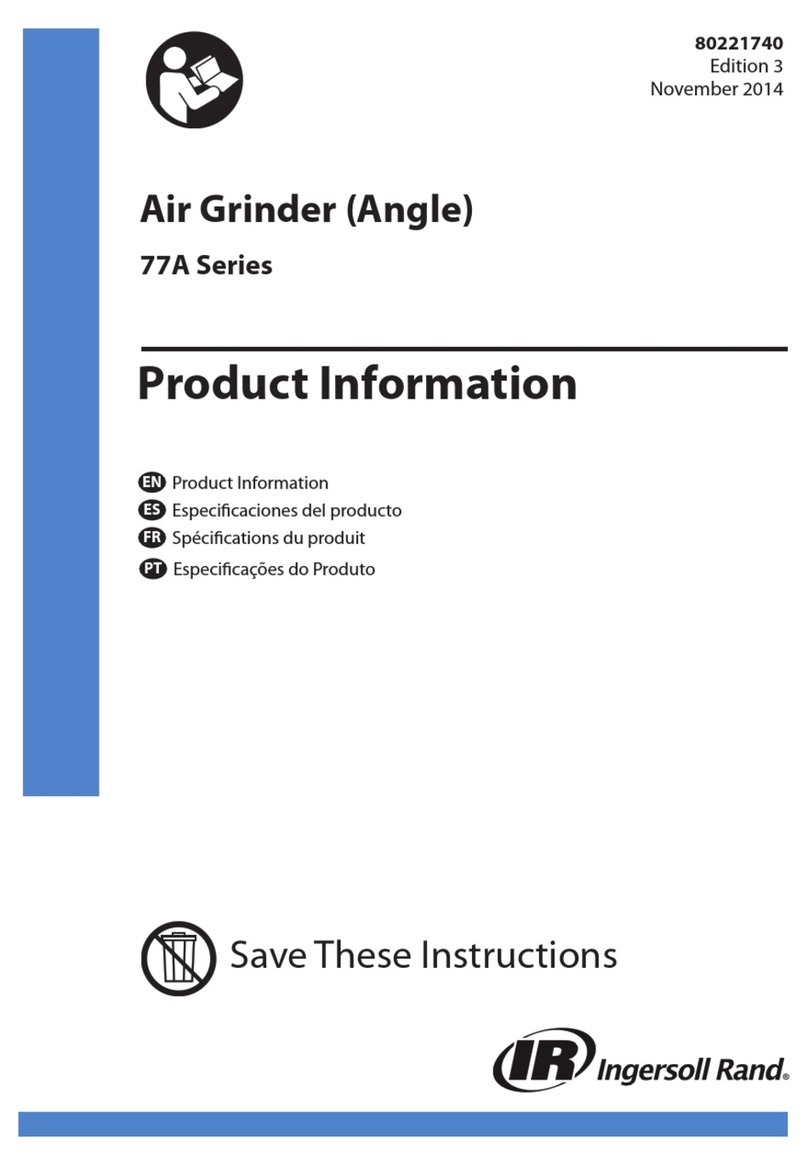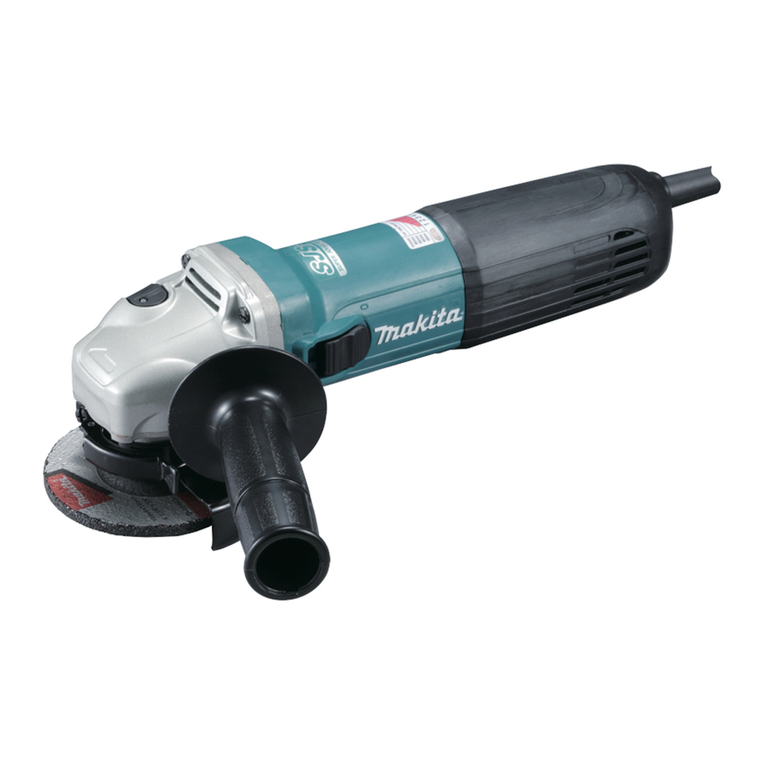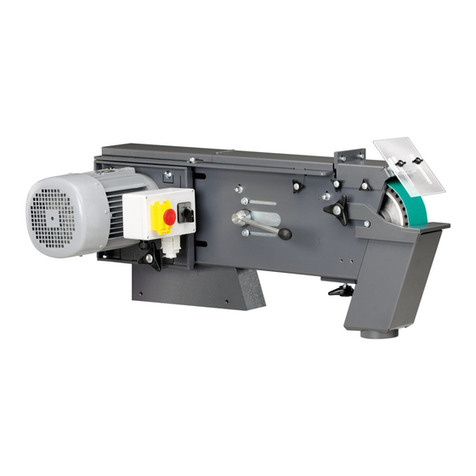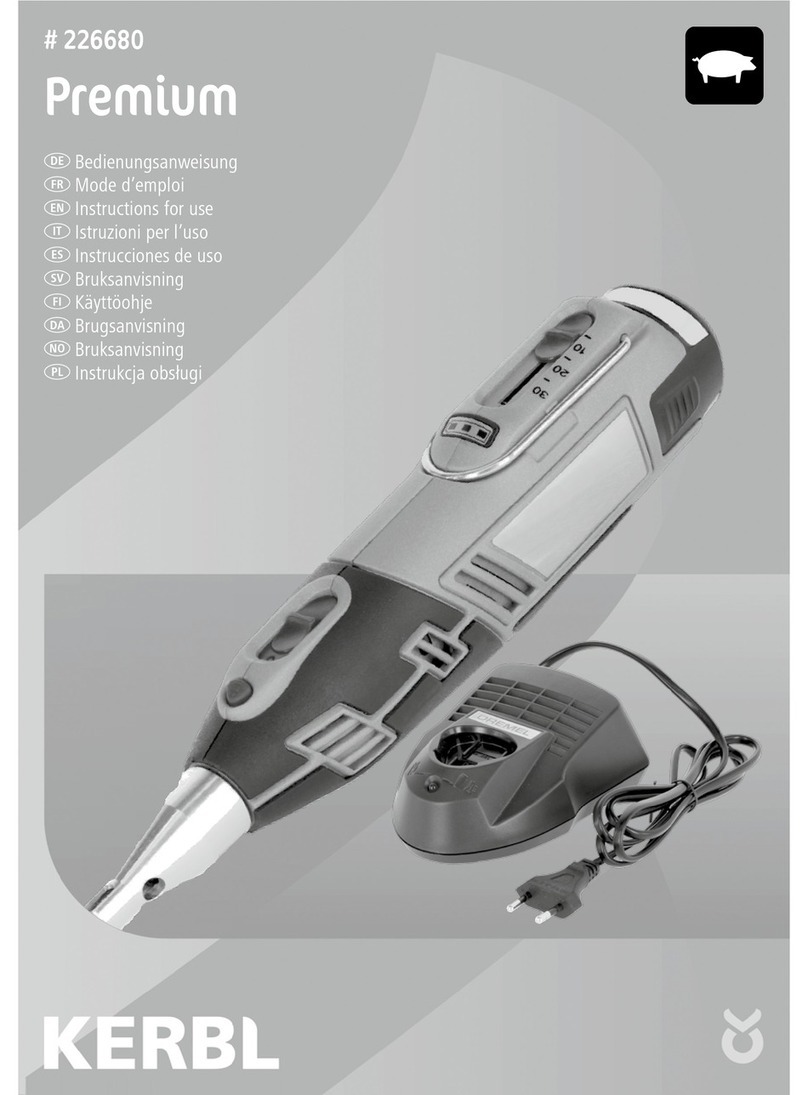Henry Airtools 56 VL Guide

The henry Tool Co., ManufaCTured by henry Tools
498 so. belvoir blvd., souTh euClid, oh 44121 u.s.a.
Ph: (216) 291-1011 or (800) 826-5257 ● Fax: (216) 291-5949 or (800) 303-2800
Email: da[email protected] ● WEbsitE: WWW.hEnrytools.com
General Safety and Maintenance Manual
Model
Number
Throttle
Type
Power
Output
Weight Height over
Spindle
Air
Consumption Rated Speed/Wheel Capacity
56VL LEVER 3 H.P.
(2250 W)
8.8 Lbs.
(4.0 Kg)
7.1 Inches 18 cm 45 cfm
(21.2 L/s)
4500 RPM w/ 9 Inch T27 Wheel Guard
4500 RPM w/ 9 Inch T28 Wheel Guard
6000 RPM w/ 7 Inch T27 Wheel Guard
6000 RPM w/ 7 Inch T28 Wheel Guard
6000 RPM w/ 9 Inch T27 Wheel Guard
6000 RPM w/ 9 Inch T28 Wheel Guard
8000 RPM w/ 7 Inch T27 Wheel Guard
8000 RPM w/ 7 Inch T28 Wheel Guard
(NOTE: Standard RPM is 6000RPM)
56VS SAFETY
LEVER
3 HORSEPOWER VERTICAL GRINDERS
MODELS
56 VL
56 VS

HENRY TOOLS, INC. Ph: (216) 291-1011 or (800) 826-5257
Note: The grinding wheel shown has a threaded hub.
General Operators Instructions and Service Manual
www.HenryTools.com | Page 172 Revised 12/10/15
For additional product information visit our website.
MODELS
56 VL
56 VS

HENRY TOOLS, INC. Ph: (216) 291-1011 or (800) 826-5257
General Operators Instructions and Service Manual
www.HenryTools.com | Page 173
Revised 12/10/15 For additional product information visit our website.
Part No. Description
200-9 O-Ring
500-46 Snap Ring
550-33-L Live Handle Adaptor bushing
550-33-SW Screen Filter
550-33-SP Spacer
550-38 Lever
550-50 Lever Pin
560-13 Throttle Valve Assembly
with 200-9 O-ring installed
600-51 Plunger Spring
650-1-AL Live Handle Body (Non-Lockout
type)
650-1-ALS Safety Lock Valve Body(Bare)
AA-650-1-AL Handle Assembly (Complete)
(Non-lockout handle)
Part No. Description
AA-650-1-ALS Safety Lock Handle Assembly
(Complete)
650-33 Screen Bushing(1/2x3/8)
650-54 Safety Lock Pin
650-55 Safety Lock Spring
650-56 Safety Lock Lever
650-57 Set Screw
700-30 O-Ring
700-48 Cap Screw
700-54 Lock Washer
700-S-26 Plug
700-S-26-GK Gasket
841555 Screen Bushing (1/2X1/2)
MODELS
56 VL
56 VS

HENRY TOOLS, INC. Ph: (216) 291-1011 or (800) 826-5257
General Operators Instructions and Service Manual
www.HenryTools.com | Page 174 Revised 12/10/15
For additional product information visit our website.
PART NO. DESCRIPTION
200-9 O-RING
500-46 SNAP RING
550-1-BT BEARING SUPPORT(OLD STYLE) still
supported by Henrytools
550-1-BTB BEARING SUPPORT PLATE (NEW
STYLE) can be used on ALL 56V
Grinders
550-1-BTG GASKET (4 holed)
550-1-C DEAD HANDLE
550-2 CYLINDER
550-3 REAR ENDPLATE
550-5 ROTOR
550-6 BLADE (5 REQ.)
550-7 FRONT ENDPLATE
550-8 SPINDLE (See Part #555-8)
550-10 KEY
550-12A WHEEL FLANGE
550-12B WHEEL FLANGE
550-13 GASKET
550-21 SNAP RING
550-25 BEARING COVER
550-33L ADAPTOR CAP
550-33-SW SCREEN FILTER
550-33-SP SPACER
550-38 Lever
550-48 SCREW (4 REQ.)
550-49 PIN
550-50 LEVER PIN
550-54 WASHER (4 REQ.)
560-1 Case (Bare)with RPM tag
560-13 VALVE with 200-9 O-RING
555-8 SPINDLE (Updated Version)
650-33 3/8-1/2 BUSHING
650-54 LOCKOUT LEVER PIN
600-51 SPRING
650-55 SPRING
650-56 LOCKOUT LEVER
PART NO. DESCRIPTION
650-57 SET SCREW
650-58 SCREW
650-60 ASSEMBLY COLLAR AND SCREW
650-1-AL NON-LOCKOUT LEVER CASE
650-1-ALS LOCKOUT LEVER CASE BODY
700-6 LOCK RING (OLD STYLE) still sup-
ported by Henrytools
700-7 BEARING
700-9 BEARING
700-30 O-RING
700-34 SPINDLE NUT
700-37 CYLINDER PIN
700-46 WASHER (4-8 REQ.)
700-47A SCREW (4 REQ.)
700-48 SCREW
700-49 SCREW (Old Style)
700-54 WASHER
700-S-26 CAP
700-S-26-GK GASKET
1000-5 SNAP RING
841555 1/2x1/2 BUSHING
GUARDS
700-200 7”TYPE 27 GUARD
700-201 9”TYPE 27 GUARD
412988 6” CUP GUARD
WRENCHES
1100-094 15/16”WRENCH
1100-200 2”WRENCH
1102-015 ALLEN WRENCH
102-SPWR SANDING PAD NUT WRENCH
REPAIR KITS
510123 REPAIR KIT (INCLUDES: Bearings,
Rotor Blades, Gaskets and Snap
Rings).
ASSEMBLIES
650-50 WHEEL LOCK ASSY.
MODELS
56 VL
56 VS

HENRY TOOLS, INC. Ph: (216) 291-1011 or (800) 826-5257
General Operators Instructions and Service Manual
www.HenryTools.com | Page 175
Revised 12/10/15 For additional product information visit our website.
PART NO. DESCRIPTION
AA-560-1 CASE ASSY.(Comes with all screws)
Specify the speed
AA-650-1-AL LEVER LIVE HANDLE ASSEMBLY
COMPLETE with screwsNON lockout
Style
AA-650-1-ALS LOCKOUT LEVER LIVE HANDLE AS-
SEMBLY COMPLETE with screws
GOVERNORS
AA-550-45 GOV.ASSY. (4500 RPM)
AA-550-60 GOV.ASSY. (6000 RPM)
AA-550-72 GOV.ASSY.(7200 RPM)
AA-550-80 GOV.ASSY. (8000 RPM)
• OTHER SPEEDS AVAILABLE
ACCESSORIES
849259 5/8-11 Sanding Pad Nut
849913 7” SANDING PAD
(MAX 8500 RPM
849914 9” SANDING PAD (MAX 6500RPM)
849269 DEPRESSED CENTER WHL ADAPT
KIT
MODELS
56 VL
56 VS

HENRY TOOLS, INC. Ph: (216) 291-1011 or (800) 826-5257
Type 11 Wheel Mounting
(CUP WHEELS)
General Operators Instructions and Service Manual
www.HenryTools.com | Page 176 Revised 12/10/15
For additional product information visit our website.
General Wheel Mounting Instructions
Wheels known to have been subjected to improper mounting procedures
can burst violently and should be destroyed rather than risk their use by
someone who may not notice that the wheels are damaged.
Note: The grinding wheel shown above has threaded hub.
Your new Vertical grinder anges must be at, not relieved, and free of nicks or burrs. Flanges for Type 6 or 11
wheels must be at least 1/3 the wheel diameter. Always use wheel retainer supplied by manufacturer on Type 6 or I1
wheels(CupWheels). When using depressed center wheels, only use adapters supplied by the manufacturer unless they
are furnished as a part of the wheel. Do not reuse throwaway adapters attached to depressed center wheels by the
manufacturer. Spindles must not be bent and threads must be free of any damage that might keep a wheel from being
centrally mounted or seated properly against driving ange. Wheel must be sufciently tightened to prevent spin-off.
Before using or after mounting wheel, the tool must be run for one minute in a protected enclosure to check integrity of
the wheel.
WARNING: FRAGMENTS FROM AN ABRASIVE
WHEEL THAT BREAKS OR COMES APART WHILE
ROTATiNG CAN CAUSE SERIOUS INJURY OR EVEN
DEATH. NEVER OPERATE A WHEEL TYPE GRINDER
WITHOUT A GUARD.
Cup wheels are mounted directly onto
the tool. No additional accessories are
required.
Type 27, 28 or 29 Depressed center wheels can be mounted as shown below.
Note: the 650-60 is shipped STANDARD on your Vertical Grinder.
INSPECT THE WHEEL OR ACCESSORY
Check the maximum safe RPM marked on the wheel or accessory. Never use a wheel or accessory rated below the actual
tool speed. Cracked, dropped, faulty, or bent accessories are dangerous. Suspect accessories should not be used and
should be disposed of. Inspect wheel for cracks or chips, water stains, or signs of abuse or improper storage Cracked or
faulty grinding wheels are dangerous. They must be destroyed rather than risk their use by someone who may not notice
that they are damaged.
MODELS
56 VL
56 VS

HENRY TOOLS, INC. Ph: (216) 291-1011 or (800) 826-5257
General Operators Instructions and Service Manual
www.HenryTools.com | Page 177
Revised 12/10/15 For additional product information visit our website.
Do Not Throw Away
These Instructions!!
SAFETY FIRST!
ALWAYS COMPLY WITH:
1.General Industry Safety & Health Regulations, Part 1910, OSHA 2206, avail-
able from: Sup’t of Documents; Government Printing Ofce; Washington DC
20402
2.Safety Code for Portable Air Tools, ANSI B186.1 available from:
American National Standards Institute, Inc.; 1430 Broadway; New York, NY
10018
3.State and Local regulations.
Portions of the above codes and regulations are listed below for quick refer-
ence.
THESE EXCERPTS ARE NOT INTENDED TO BE ALL INCLUSIVE - STUDY AND
COMPLY WITH ALL REGULATIONS!
in this operating instruction, alerting to hazards for
life and health of people. Observe these notes and
proceed with special care in the cases described.
Pass all safety instructions on to other operators. In
addition to the safety instructions in this operating
instruction, the general local safety and accident
prevention rules must be observed.
Important Notes
CAUTION The signal word “caution!” identies all
portions of this operating instruction meriting spe-
cial attention to ensure that guidelines, rules, hints
and the correct work procedures are observed;
and, to prevent damage to and destruction of the
grinder and/or parts.
A recommended spare part (or set) for every ve
(5) tools. Small, low cost or easily lost parts should
be stocked as 3-4 per 10 tools.
WARNING’: Disconnect the air supply hose before
servicing the tool.
INSTALLATION
For most efcient operation, 90 psig (620 kPa) of
clean dry air is required at the tool with the tool
running, with-out extreme uctuation. Minimum
recommended hose size is 3/8” I.D. when the
length of the hose is eight feet or less. An air line
lter and lubricator, should be used. Hose should be
blown out before attaching to the tool.
Loss of Power
A loss of power may not be related to the tool.
First, check the air line pressure. It should be 90
psi at the tool while operating.
LUBRICATION
Lubricate the motor with an air line lubricator,
using a light air motor oil. Adjust the lubricator
to dispense one drop per cycle or three drops per
minute.
CAUTION Do not use substitutes for oil and grease.
This could
result in damage to the tool.
MAINTENANCE
1. Proper and continuous lubrication.
2. Blow out air hose to assure a clean air supply.
3. Be sure the air lter and line lubricator are clean.
4. Fill the line lubricator before operation.
5. Place a few drops of oil into the air inlet of the
tool be-fore attaching the air line.
6. Use moisture separators to remove water from
the air line.
7. CAUTION Do not use solvent on bearings or on
any parts made of a synthetic material.
8. Do not remove bearings unless replacement is
necessary; bearings are a press t.
Always wear eye protection when operating or
performing maintenance on this tool.
Always wear hearing protection when operating this
tool.
Keep hands, loose clothing and long hair away from
rotating end of tool.
Anticipate and be alert for sudden changes in mo-
tion during start up and operation of any power
tool.
Keep body stance balanced and rm. Do not over-
IMPORTANT SAFETY INFORMATION ENCLOSED.
READ AND UNDERSTAND THIS MANUAL BEFORE OPERATING TOOL. IT IS THE
RESPONSIBILITY OF THE EMPLOYER TO PLACE THE INFORMATION IN THIS
MANUAL INTO THE HANDS OF THE OPERATOR.FAILURE TO OBSERVE THE FOL-
LOWING WARNINGS COULD RESULT IN INJURY.
PLACING TOOL IN SERVICE
• Always operate, inspect and maintain this tool in accordance with all regu-
lations (local, state, federal and country), that may apply to hand held/hand
operated pneumatic tools.
• Always turn off the air supply and disconnect the air supply hose before
installing, removing or adjusting any accessory on this tool, or before per-
forming any maintenance on this tool.
• Do not use damaged, frayed or deteriorated air hoses and ttings.
• Be sure all hoses and ttings are the correct size and are tightly secured. l
Always use clean, dry air at 90 psig (6.2 bar/620 kPa) maximum air pressure.
Dust, corrosive fumes and/or excessive moisture can ruin the motor of an air
tool.
• Do not lubricate tools with ammable or volatile liquids such as kerosene,
diesel or jet fuel.
Do not remove any labels. Replace any damaged label.
1.TOOL INTENT -Henry Tools vertical Grinders are designed for heavy material
removal. For consistent, quality performance in foundries, welding shops, fabri-
cation facilities, steel mills and shipyards. Tools shall be used only for purposes
intended in their design (refer to product catalog).
2.AIR SUPPLY - Test and operate tools at 90 PSIG (6.2 bar/620 kPa) maxi-
mum air pressure at the inlet with 3/8” (10 mm) inside diameter air supply
hose. Use recommended airline lters-regulators-lubricators. Choose tools with
enough horsepower to drive the abrasive material you are using, and allow the
grinder’s speed to work for you.
3.UNUSUAL SOUND or VIBRATION - If tool vibrates or produces an unusual
sound, repair immediately for correction.
4.OPERATOR PROTECTIVE EQUIPMENT - Wear goggles or face shield at all
times tool is in operation. Other protective clothing shall be worn, if necessary.
SEE REGULATIONS.
5.SAFETY MAINTENANCE PROGRAM - Employ a safety program to provide
inspection and maintenance of all phases of tool operation and air supply equip-
ment in accordance with “Safety Code for Portable Air Tools.”
WARNING: The signal word ‘Warning” identies all notes on safe work practices
MODELS
56 VL
56 VS

HENRY TOOLS, INC. Ph: (216) 291-1011 or (800) 826-5257
General Operators Instructions and Service Manual
www.HenryTools.com | Page 178 Revised 12/10/15
For additional product information visit our website.
reach when operating this tool. High reaction torques can
occur at or below the recommended air pressure.
Tool accessories may continue to rotate briey after throttle
is released.
Air powered tools can vibrate in use. Vibration, repetitive
motions or uncomfortable positions may be harmful to your
hands and arms. Stop using any tool if discomfort, tingling
feeling or pain occurs.
Seek medical advice before resuming use.
Use accessories recommended by Henry Tools.
This tool is not designed for working in explosive atmo-
spheres.
This tool is not insulated against electric shock.
Product Description
An Air Grinder is a compressed air powered hand-held rotary
power tool driving a rotating arbor (spindle) on which a grind-
ing wheel or other abrasive accessory is mounted. A guard
is required on all grinders, unless used with specic abrasive
products and under special conditions. See additional warn-
ings given below for Unguarded Grinders.
WARNING
General Product Safety Information
• IT IS YOUR RESPONSIBILITY TO MAKE THIS SAFETY INFOR-
MATION AVAILABLE TO OTHERS THAT WILL OPERATE THIS
PRODUCT.
• Failure to observe the following warnings could result in
injury.
WARNING
Product Safety information - When Placing the Tool in Service
• Always install, operate, inspect and maintain this product in
accordance with all applicable standards and regulations (lo-
cal, state, country, federal, etc.).
• Always use clean, dry air at 90 psig (6.2 bar/620 kPa) maxi-
mum air pressure at the inlet. Higher pressure may result in
hazardous situations including excessive speed, rupture, or
incorrect output torque or force.
• Be sure all hoses and ttings are the correct size and are
tightly secured.
• Install a properly sized Safety Air Fuse upstream of hose
and use an anti-whip device across any hose coupling without
internal shut-off, to prevent hose whipping if a hose fails or
coupling disconnects.
• Ensure an accessible emergency shut off valve has been
installed in the air supply line, and make others aware of its
location.
• Do not use damaged, frayed or deteriorated air hoses and
ttings.
• Keep clear of whipping air hoses. Shut off the compressed
air before approaching a whipping hose.
• Always turn off the air supply, bleed the air pressure and
disconnect the air supply hose before installing, removing or
adjusting any accessory on this tool, or before performing any
maintenance on this tool or any accessory.
• Do not lubricate tools with ammable or volatile liquids
such as kerosene, diesel or jet fuel. Use only recommended
lubricants.
• Use only proper cleaning solvents to clean parts. Use only
cleaning solvents which meet current safety and health stan-
dards. Use cleaning solvents in a well ventilated area.
• Keep work area clean, uncluttered, ventilated and illumi-
nated.
• Do not remove any labels. Replace any damaged label.
• For those grinders designed for use with wheels of four inches
diameter and larger, separate the grinder from any quick-disconnect
couplings by a hose whip. Never install a quick-disconnect directly into
these tools.
WARNING
PRODUCT SAFETY INFORMATION - WHEN USING THE TOOL:
• Always wear eye protection when operating or performing mainte-
nance on this tool.
• Always wear hearing protection when operating this tool.
• Always use Personal Protective Equipment appropriate to the tool
used and material worked. This may include dust mask or other
breathing apparatus, safety glasses, ear plugs, gloves, apron, safety
shoes, hard hat and other equipment.
When wearing gloves always be sure that the gloves will not prevent
the throttle mechanism from being released.
• Prevent exposure and breathing of harmful dust and particles cre-
ated by power tool use.
- Some dust created by power sanding, sawing, grinding, drilling, and
other construction activities contains chemicals known to cause can-
cer, birth defects or other reproductive harm. Some examplesof these
chemicals are:
- lead from lead based paints,
- crystalline silica from bricks and cement and other masonry prod-
ucts, and arsenic and chromium from chemically treated lumber.
- Your risk from these exposures varies, depending on how often you
do this type of work. To reduce your exposure to these chemicals:
work in a well ventilated area, and work with approved safety equip-
ment, such as those dust masks that are specially designed to lter
out microscopic particles.
• Keep others a safe distance from your work area, or ensure they use
appropriate Personal Protective Equipment.
• This tool is not designed for working in explosive environments, in-
cluding those caused by fumes and dust, or near ammable materials.
• This tool is not insulated against electric shock.
• Be aware of buried, hidden or other hazards in your work environ-
ment. Do not contact or damage cords, conduits, pipes or hoses that
may contain electrical wires, explosive gases or harmful liquids.
• Keep hands, loose clothing, long hair and jewelry away from working
end of tool.
• Power tools can vibrate in use. Vibration, repetitive motions or
uncomfortable positions may be harmful to your hands and arms. Stop
using any tool if discomfort, tingling feeling or pain occurs. Seek medi-
cal advice before resuming use.
• Keep body stance balanced and rm. Do not overreach when operat-
ing this tool. Anticipate and be alert
for sudden changes in motion, reaction torques, or forces during start
up and operation.
• Tool and/or accessories may briey continue their motion after
throttle is released.
• To avoid accidental starting - ensure tool is in “off” position before
applying air pressure, avoid throttle
when carrying, and release throttle with loss of air.
• Ensure work pieces are secure. Use clamps or vises to hold work
piece whenever possible.
• Do not carry or drag the tool by the hose.
• Do not use power tools when tired, or under the inuence of medica-
tion, drugs, or alcohol.
• Never use a damaged or malfunctioning tool or accessory.
• Do not modify the tool, safety devices, or accessories.
• Do not use this tool for purposes other than those recommended.
MODELS
56 VL
56 VS

HENRY TOOLS, INC. Ph: (216) 291-1011 or (800) 826-5257
General Operators Instructions and Service Manual
www.HenryTools.com | Page 179
Revised 12/10/15 For additional product information visit our website.
• Use accessories recommended by Ingersoll-Rand.
• Do not use this tool if the actual free speed
exceeds the rated rpm. Check the free speed of
the Grinder before mounting a wheel, after all tool
repairs, before each job and after every 8 hours
of use. Check speed with a calibrated tachometer,
without the abrasive product installed.
• Do not use any wheel or other abrasive accessory
whose maximum operating speed, as dened by its
manufacturer, is less than the rated speed of the
Grinder.
• Inspect all grinding wheels for chips or cracks
prior to mounting. Do not use a wheel that is
chipped, cracked or otherwise damaged.
• Inspect arbor, threads & clamping devices for
damage & wear prior to mounting wheel or other
abrasive accessory.
• Do not use a grinding wheel that has been ex-
posed to freezing temperatures, extreme tempera-
ture changes, high humidity, solvents, water or
other liquids.
• Make certain grinding wheel or other abrasive ac-
cessory properly ts the spindle. The wheel should
not t too snugly or too loosely. Plain hole wheels
should have about .007” (0.17 mm) maximum
diametral clearance. Do not use reducing bushings
to adapt a wheel to any arbor unless such bushings
are supplied by and recommended by the wheel
manufacturer.
• Blotters shall always be used between anges
and abrasive wheel surfaces to ensure uniform
distribution of ange pressure (except type 27 & 28
wheels) and shall cover the entire contact area of
the wheel ange.
• Always use the wheel anges furnished by the
manufacturer and appropriate for the wheel size
and type.
Never use a makeshift ange or plain washer.
Flanges should be in good condition and free of
nicks, burrs and sharp edges.
• Ensure that the thread type and size of the
threaded abrasive product exactly matches the
thread type and size of the spindle.
• Prevent the spindle end from touching the bottom
of the hole of cups, cones or plugs with threaded
holes, intended to be mounted on machine spin-
dles, by comparing dimensions and other relevant
data for them.
• Ensure that the grinding wheel or other abra-
sive accessory is correctly mounted and tightened
before use.
• Before starting this tool, the operator shall make
sure that no one is in the plane of rotation.
• Wear Personal Protective Equipment and remove
ammable objects from the work area to ensure
that sparks and debris do not create a hazard when
using this tool.
• After mounting a wheel or other abrasive ac-
cessory, the Grinder shall be run in a protected
enclosure, at gradually increasing speed, for at
least 60 seconds. Make certain no one is in front of
or in line with the wheel or other abrasive acces-
sory. Be aware that it may fail at this time if it is defective, improperly mounted
or the wrong size and speed. Stop immediately if considerable vibration or other
defects are detected. Shut off the air supply and determine the cause.
• Do not use this tool on materials whose dust or fumes can cause a potentially
explosive environment.
• When starting a cold wheel, apply it to the work slowly until the wheel gradu-
ally warms up. Make smooth contact with the work, and avoid any bumping
action or excessive pressure.
• If the grinder is dropped or bumped, turn off the air supply and carefully
examine the grinding wheel or other abrasive accessory. Discard it if damaged,
chipped or cracked. Before reuse, run the grinder in a protected enclosure fol-
lowing the same precautions used after rst mounting.
• Before a grinder is put down, the throttle shall be released and the wheel or
other accessory shall come to a stop. Tool rests, hangers, and balancers are
recommended.
Additional Warnings for Guarded Grinders
• Do not use this Grinder without the furnished Wheel Guard.
• Incorrect combinations of grinder wheel, wheel guard and tool speed could
result in injury. Ensure that combinations are correct per the Product Specica-
tions.
• Always replace a damaged, bent or severely worn wheel guard. Do not use a
wheel guard that has been subjected to wheel failure.
• Guard opening must face away from the operator. Bottom of wheel must not
project beyond guard.
Additional Warnings for Unguarded Grinders
• Do not use an unguarded grinder unless used for internal work and only oper-
ated when the work offers protection.
NEVER MODIFY ANY PART OF
THIS TOOL!!! Serious injury can result.
PRODUCT SAFETY INFORMATION WHEN
USING THE TOOL:CONTINUED
MODELS
56 VL
56 VS

HENRY TOOLS, INC. Ph: (216) 291-1011 or (800) 826-5257
General Operators Instructions and Service Manual
www.HenryTools.com | Page 180 Revised 12/10/15
For additional product information visit our website.
PRODUCT SAFETY INFORMATION - WHEN
USING THE TOOL:(CONTINUED)
Additional Warnings for Use of Cut-off Wheels (Type 1 and 27A)
• When cutting, support the workpiece so the slot is kept at
constant or increasing width during the whole operation.
• If the abrasive product gets jammed in a cut slot, shut off
the grinder and ease the wheel free. Check that the wheel is
still correctly secured and not damaged before continuing the
operation.
• A cut-off wheel shall not be used for side grinding. The 6 &
11 cup wheels remove large amounts of metal and are good
for open spaces. Use a Type 27 & 28 wheel for weld grinding,
notch and gate removal, pipe beveling and repair or in metal
fabrication, petrochemical maintenance or construction. After
mounting a wheel or other abrasive accessory, the Grinder
SHALL be run in a protected enclosure or under a work
bench, at a gradually increasing speed, for at least 60 seconds.
Make certain no one is in front of or in line with the wheel or
other abrasive accessory. Be aware that it may fail at this time
if it is defective, improperly mounted or the wrong size and
speed. STOP IMMEDIATELY if considerable vibration or other
defects are detected. Shut off the air supply and determine the
cause.
Your selection and purchase of nishing tools has a direct effect
on process and product quality. Your decision can make a dif-
ference in nishing efciency and in the improved quality and
durability of nishes. Only use recommended equipment and
adaptors. Inspect grinding wheels closely for any imperfections,
damage or broken edges. Use correct size guards, anges,
blotters, spindles and mounting practices to ensure operator
safety. All give you the ability to match capacity and attach-
ment precisely to the work piece and material for nessing a
high quality nish
MODELS
56 VL
56 VS

HENRY TOOLS, INC. Ph: (216) 291-1011 or (800) 826-5257
General Operators Instructions and Service Manual
www.HenryTools.com | Page 181
Revised 12/10/15 For additional product information visit our website.
DISASSEMBLY
1. Disconnect air and remove all wheels and accessories from
grinder.
2. Secure the dead handle (550-1-C) of the grinder in a vice.
3. Remove the four socket head screws (700-47A) and re-
move wheel guard.
4. Grasp the wheel ange (550-12A)and pull the complete
motor assembly from the case. If the case is too tight, put
5/8-11 hex nut on shaft and grip rmly in vise; using soft
hammer, remove case assembly by tapping alternately at
live and dead handle joints.
5. Put the ats of the wheel ange in the vise and remove
governor. (NOTE: LEFT HAND THREAD) So removal of
the governor should be turned CLOCKWISE.
6. Remove lock ring (1000-5). Holding the cylinder (550-2)
in the left hand, place a long tap pin in the hole left by the
removal of the governor. With a small hammer, tap light]y
on the end of this pin, which separates the spindle (555-8)
from the rear bearing (700-9) and the rear thrust (550-3).
Remove cylinder (550-2), rotor blades (550-6) and rotor
(550-5).
7. Do not remove key (550-10) at this time.
8. Clamp spindle holder in vise vertically. Line up the key-
way in the holder and slide the spindle assembly through.
Remove wheel ange (550-12A) (right hand thread) with
suitable wrench.
9. Remove spindle assembly from vice or holder. Remove
key and press spindle out of bearing support.(550-1-BTB).
Remove snap ring(550-21) and spacer (550-25).
10. To check throttle valve, unscrew plug (700-S-26) and lift
out valve spring (600-51) and plunger (560-13). Remove
the “o” ring (200-9) with a sharp tool and replace with a
new ring.
REASSEMBLY
1. Seat (700-7) bearing in bearing support(550-1-BTB), then
replace spacer (550-25). Replace Snap ring (550-21)into
groove.
2. Press spindle into bearing support & through the(700-7)
bearing.
3. Place key (550-10) into spindle keyway.
4. Clamp spindle holder in vise vertically. Line up the keyway
in the holder and slide the assembly through.
5. Thread wheel ange(550-12-A) clockwise by hand until
wheel ange bottoms on bearing. Tighten down with a
suitable wrench.
6. Remove assembly from spindle holder.
7. Clamp wheel ange (550-12A) vertically in vise.
8. Line up cylinder pin holes in the bearing support (550-1-
BT) and the front thrust (550-7).
9. Put key (550-l0) in spindle keyway and slide rotor (550-5)
down onto arbor (555-8) and insert blades (550-6). Put
cylinder (550-2) into place (NOTE:Numerous holes on top
of cylinder face upwards toward you).
10. Slip rear bearing (700-9) in rear thrust (550-3) and press
on spindle.(Press on inner race of bearing.) Be
sure that short dowel pin in cylinder goes into
hole in rear thrust(550-3).
11. Put lock ring (1000-5) on spindle. (Note: There
is no groove.)
12. Prior to reassembly inspect governor for
gouges,nicks or dents. Screw governor tight
in rear spindle.(NOTE: THIS IS LEFT HAND
THREAD) Oil governor and inside of motor.
13. Assemble live handle; add live and dead
handles to case; place gasket (550-13) in rear
face of case.
14. Drop motor assembly package in case and line
up holes in front bearing support with those in
front of case.
15. Line up guard with motor holes. Install the four
bolts (700-47A) and lock washers (700-46).
Tighten bolts down until snug then back off 1/2
turn.
16. Connect tool to air supply and apply air in sev-
eral short bursts tightening the motor screws
(700-47A) till the tool runs smoothly.
MODELS
56 VL
56 VS
This manual suits for next models
1
Table of contents
